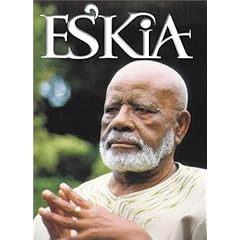I am so deeply ashamed by the fact that my specialization at university was postcolonial literature in English and I can hardly name any black South African writer (I know Bessie Head but she’s usually considered a Batswana writer, even though she was born in South Africa). Not that you find many books by black South African writers in bookshops, but I think I’ve seen a book my Zakes Mda in my local library. Now that I’ve checked the list on wikipedia I can name some black South African writers apart from these two: Mongane Wally Serote, Sipho Sepamla, K. Sello Duiker, Phaswane Mpe, Njabulo Ndebele, Mbongeni Ngema and Miriam Tlali. I know they are difficult names to keep in mind, but I'll do my best...
 Es’kia Mphahlele was born in Marabastad Township in Pretoria, but spent most of his childhood in Maupaneng, a large village outside Pietersburg (now Polokwane). At 13, he and his brother and sister returned to Pretoria, moving in with their maternal grandmother in a house on Second Avenue in a teeming slum neighborhood.
Es’kia Mphahlele was born in Marabastad Township in Pretoria, but spent most of his childhood in Maupaneng, a large village outside Pietersburg (now Polokwane). At 13, he and his brother and sister returned to Pretoria, moving in with their maternal grandmother in a house on Second Avenue in a teeming slum neighborhood.Collecting and delivering the laundry that his grandmother washed for white customers, he learned his place in South African society. About school, he said that it left him “detribalized, Westernized, but still African.” The conflict, both social and artistic, between African and Western identities would become an important theme in his work.
His first book of short stories, Man Must Live, was published in 1947. Banned from teaching in his country by the apartheid government, he fled to the British Protectorate of Basutoland, now Lesotho. Due to his political commitment, he lived most of his life in exile, teaching in Nigeria, Kenya, Zambia, France and in the United States.
He wrote most of his books in exile, for example The Living and the Dead (1961) and In Corner B (1967). His memoir Down Second Avenue (1959) vividly dramatized the injustices of apartheid and became a landmark work of South African literature. Its depiction of traditional rural life, and of violence and oppression in a black township in Pretoria, reflected the experience of countless thousands of his fellow black South Africans. In his first novel, The Wanderers (1971), Mphahlele offered a sweeping view of African racial problems as seen through the eyes of an exile very much like himself, unable to live in South Africa but ill at ease in freer African states.
In 1977 he surprised everyone by going back to South Africa and becoming the first black professor at Witwatersrand University, where he created the department of African Literature.
In an essay in The Star, a Johannesburg newspaper, the journalist and editor Barney Mthombothi wrote, “If Nelson Mandela is our political star, Mphahlele was his literary equivalent.”
We appreciate your hardwork prof mphahle u r encouraging us nd our upcoming child, i even read 1 of your story " The Dube train" is quite interesting
ReplyDelete